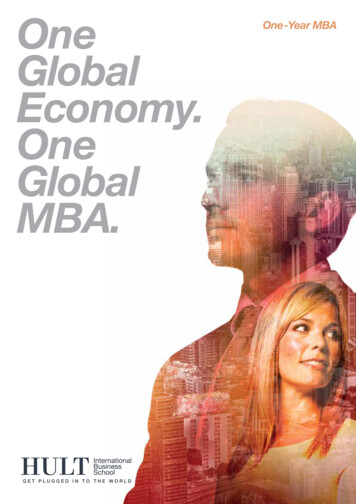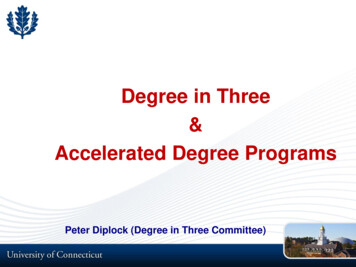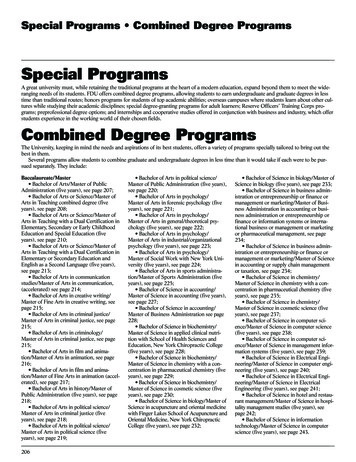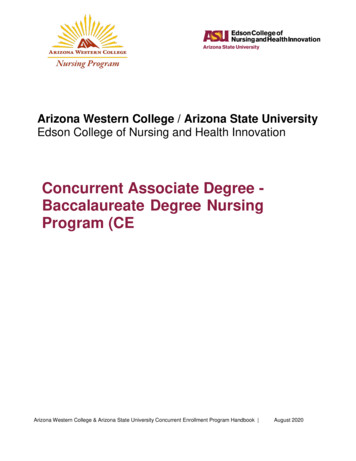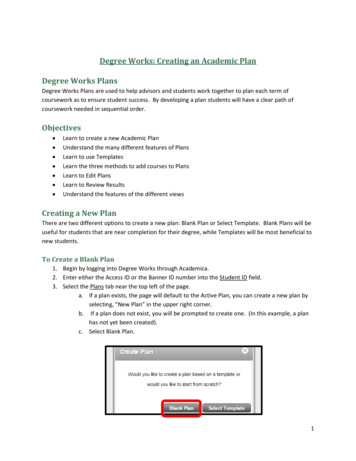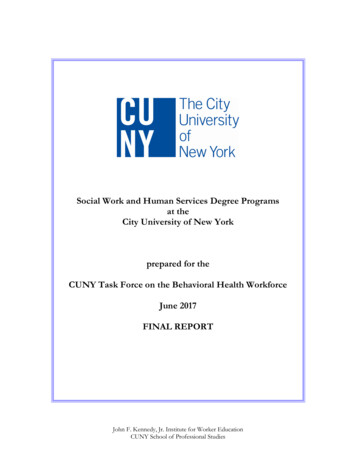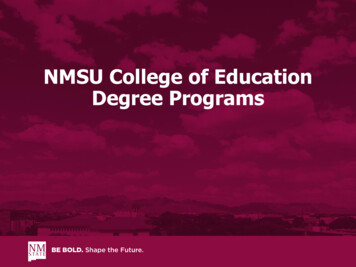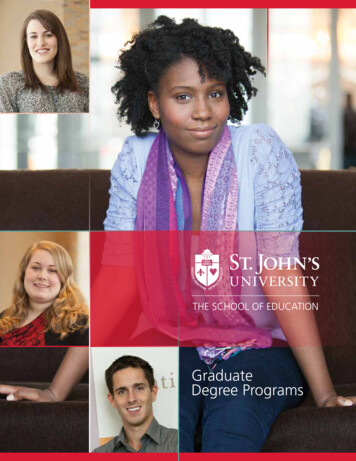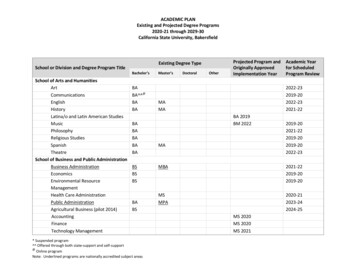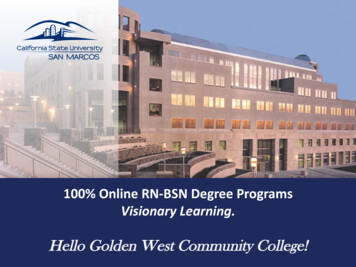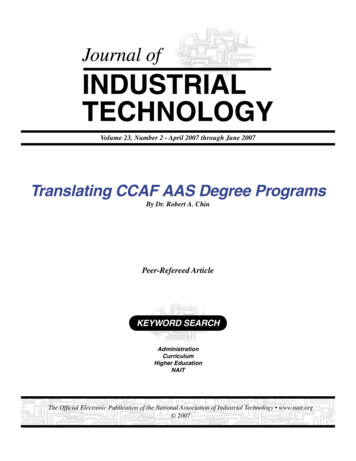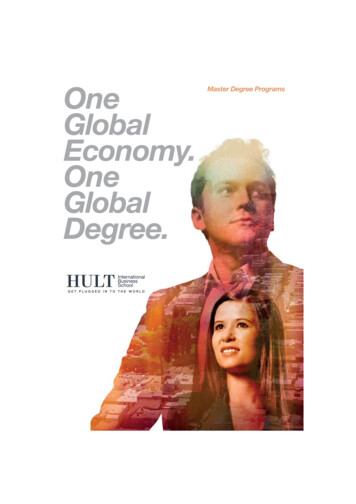
Transcription
OneGlobalEconomy.OneGlobalDegree.Master Degree Programs
One1st in International Experience—The Financial Times 20121st in Return on Investment—The Economist 20111st in Post-Graduation Salary Increase—The Economist 20111st business school to have five global campuses and the ability to rotateCreated the world’s largest crowdsourcing event for social good—The Hult PrizeThe world’s largest graduate business school in 20122hult.edu3
OurHistory“ Today, success in business is asmuch about understanding culturesand globalization as it is aboutunderstanding finance and marketing.With our exceptional faculty, rigorouscurriculum, and unique campusnetwork, Hult International BusinessSchool is committed to educating notjust leaders of business, but leadersof the world.”Our legacy of providing globally relevant, practicaleducation shapes our future as the world’s largestgraduate business school.Bertil Hult1964—A practicalbusiness educationToday—The world’s largestgraduate business schoolIn 1964, the school was established asAmerica’s first corporate university, thenknown as the Arthur D. Little School ofManagement (ADL). ADL focused ondelivering a practical business educationfor managers. The teaching pedagogy wasdifferent because it emphasized “actionlearning”—applying classroom theory inthe real world. This methodology washoned over 40 years and is central to Hult’spioneering approach to practical businesseducation today.Hult’s compelling vision of a practical andglobal business education has attracted manystudents from around the world. Today, Hulthas grown to become the world’s largestgraduate business school. Our growthdemonstrates the tremendous demand for aninnovative and practical business education.The world’s largest graduatebusiness schools*1Hult International Business School22003—The world’s mostinternational business school3In 2003, one of Europe’s most successfulentrepreneurs, Bertil Hult, financiallysupported the school to expand its teachingmethodology to not only train effectivemanagers but also prepare them to thriveon a global stage. Bertil Hult stronglybelieved students must experience culturaldifferences and global business practicesfirsthand, growing the school from its singleBoston location to a global network ofhome campuses including London, Dubai,Shanghai, and San Francisco and rotationcampuses in New York and São Paulo underthe name Hult International Business School.61964Arthur D.Little Inc., theworld’s oldestmanagement consultingfirm, establishes theManagement EducationInstitute, whichdevelops an innovative,accelerated one-yearMaster degree programto train business leaders.41976 The businessschool is officiallyaccredited by the NewEngland Association ofSchools and Colleges(NEASC), the regionalaccrediting body for allacademic institutions inthe northeastern U.S.Chairman Emeritus of Hult International Business School.Founder of EF Education First—the world’s largest privateeducation organization—and educational philanthropist.4IE Business School1,155Northwestern, Kellogg1,139Macquarie Graduate School57University of Chicago, Booth9038628 Indian Institute—Ahmedabad861985210HEC School, ParisUniversity of Columbia1,0711,008INSEADHarvard Business School2,070822Source: Annual intakes of ranked business schools from2011 The Economist Which MBA rankings (Full-time MBA,EMBA, Part-time MBA) and 2011 Financial Times Masterin Management (Master). Note figures exclude online MBAand non-reported Master degree programs.*Based on Hult 2012 projected intake figures.See Hult’s TV campaign on1998 Forbesidentifies the school’sAction Learningcurriculum as “highlydistinctive,” rankingit in the top five MBAprograms in the U.S.2002 TheEconomist ranks theschool the third-bestbusiness school inMassachusetts, afterHarvard BusinessSchool and theMassachusettsInstitute ofTechnology (MIT).2003 Theschool isrenamedHultInternational BusinessSchool, honoringbenefactor Bertil Hult’spersonal vision andcommitment toeducating internationalbusiness leaders.2005 Hult’s one-year MBA programearns the accreditationof the Associationof MBAs (AMBA),making Hult the firstbusiness school in theU.S. to be recognizedby this prestigiousinternationalaccrediting body.2008 Hult welcomes itsfirst class of students inDubai. Hult is the first U.S.academic institution to belicensed in the U.A.E.2009 The FinancialTimes adds HultInternational BusinessSchool to its prestigiousTop 100 Global MBArankings. Hult’s Londoncampus welcomesundergraduatesand graduates.2010 Hult is ranked #1in International Experienceby the Financial Times. Theschool’s fifth campus indowntown San Franciscois opened. The first HultGlobal Case Challenge islaunched, revolutionizingthe business of giving andbenefiting One Laptopper Child.2011 Hult launches aone-year Master of SocialEntrepreneurship degree.The school is ranked #3in International Businessby the Financial Times.Hult’s flagship campus inChina opens in the heartof Shanghai. Former U.S.President Bill Clinton awardsUSD1 million prize toWater.org at the Hult GlobalCase Challenge Final.2012 Hult becomes theworld’s largest graduatebusiness school, openingnew campuses in Londonand Dubai, and offersrotations to New York andSão Paulo. Hult Global CaseChallenge is renamed to theHult Prize.hult.edu5
Hult helps map your path to professional success.Why Hult?Why students choose the world’smost international business school:Global Campus RotationA U.S.-accredited degreeHult offers students a uniqueopportunity to see the world while theystudy. During your program you canstart anywhere and go anywhere. In theGlobal Campus Rotation, you can pickyour home campus and then spend upto three months studying at two others.Students could begin in Boston, thentravel to Shanghai via London or SãoPaulo, or San Francisco via Dubai orNew York. You’ll get an inside look atthe world’s fastest-growing economiesand examine international businesspractices close-up. Almost 90% of ourstudents choose Hult because they areinterested in this option, and over halfof our students spend time on morethan one campus (more on page 28).American-style graduate programshave long been the premier standard inbusiness education. Hult InternationalBusiness School is accredited by theNew England Association of Schoolsand Colleges (NEASC) and Associationof MBAs (AMBA). That means that nomatter where you decide to pursueyour Master, you will graduate with aU.S.-accredited degree.Unrivalled globalperspectiveToday’s global economy rewardspeople who can traverse borders,understand cultures, and operate ininternational contexts. Hult providesyou with an unrivaled, intimate globalexperience, working alongside peersfrom 120 nationalities speaking 105languages, learning from facultywith American, European, andemerging market expertise. Hultstudents graduate with the ability tothrive in international business andadapt rapidly to changing globalenvironments (more on page 8).6Hands-on businessexperienceUnlike other business schools thatare research-oriented, most of Hult’sfaculty have real-world experience.Many have worked for companies likeP&G, Sony, and Credit Suisse, whileothers have run their own businessesor created their own patents. Hultempowers students to developreal-world skills by completing a sixweek Action Project consulting for aleading company or non-profit likeSamsung, IBM, Nike, or One Laptopper Child. This reinforces our missionto prepare job-ready graduates whocan deliver results from day one (moreon page 12).Top-rankedbusiness schoolHult continues its rapid ascent inbusiness school rankings, currentlyranking in the top 1% of all businessschools. Hult is ranked #1 forInternational Experience and #3for International Business by theFinancial Times. Hult is ranked #20 inthe U.S. and #29 in the world by TheEconomist. Hult currently ranks #1 inpost-graduation salary increase and #1in return investment by The Economist,and our students, on average, are ableto recoup their investment in a littleover a year.Thought-leadingeducationHult is on the cutting edge ofbusiness education in several keyareas: emerging markets, digitalmarketing, social entrepreneurship,and crowdsourcing. The school haslaunched the first marketing programdedicated to digital marketing, searchengine technology, and the impact ofsocial media. In addition, you havethe option to specialize in projectmanagement concurrent to pursuingyour degree. The school alsoorganizes the world’s largest businessschool competition for the Hult Prize(formerly known as the Hult GlobalCase Challenge) which crowdsourcesideas from students all over the worldto help leading companies and nonprofit organizations tackle a majorsocial challenge.hult.edu7
YourNetworkJust WentGlobalHult gives you an astoundingly diversenetwork of connections and contacts.Snapshot of Master Class of 2013Pre-Master industryAge of Hult Master studentsFinancial ment/6%Non-profitTechnology6%Consumer edia3%Energy2%Professional Services1%Other43%35–4030–3424%22 andunder32%25–2938%23–24Work experiencePre-Master functionGeneral %60%5–7 years 7 years18%3–4 years71% 3 yearsRegions of a & Eurasia29%NorthAmerica11%SouthAsia14%AsiaPacific5% Africahult.edu9
An IntenseOne-Year Master“Hult offers the best combination of top academics, globalexposure, and active learning. I believe that’s what companiesare currently looking for, so I chose Hult. Cultural diversity is amajor asset at Hult—it is extremely rewarding to work with fourpeople from four different continents.”Guillaume CarnailleManagement Consultant, PricewaterhouseCoopersFrance, MIB Class of 201110hult.edu11
Our hands-on approach to learning helps you becomejob-ready from day one.OurLEAP MethodEmployers want graduates who are job-ready.We’ve designed our curriculum so that you don’t juststudy abstract theory—you also get hands-on experience.Our innovative curriculum is based on three components,“Learn, Experience, Action Project”—LEAP.1. Learn2. Experience3. Action ProjectHult’s LEAP method is an integratedapproach to learning that enables youto put classroom theory into practice.Experience is a crucial component ofour LEAP method. Translate theoryinto practice with insights from facultywith real-world experience, paneldiscussions with industry experts,exclusive networking opportunities,and company visits.Participate in a real-world projectfor a range of leading globalcompanies, non-profits, or fast-growthenterprises. Advised by a mentor(typically an experienced managementconsultant), small teams of studentscompete with one another todevelop a business strategy for amajor corporation.Start your Master degree by learningtheory and business fundamentalsin the classroom. Like most topbusiness schools, Hult faculty employthe case study method to illustratehow business principles are appliedin practice. Professors encouragethought-provoking class discussions tofacilitate the exchange of ideas and thesharing of experiences.Hult provides you with the theory,tools, terminology, and trends to giveyou a broad perspective on business.However, unlike other top businessschools, Hult goes beyond thetheoretical to the practical.Dialogues with prominent businessleaders offer valuable insights into howexecutives make decisions in a fastmoving, competitive environment withimperfect information. Hear firsthandadvice from executive speakers likeSteve Forbes on the choices they’vemade, the mistakes they’ve made,and tips on securing your dreamjob. Other speakers include seniorexecutives from Real Madrid FootballClub, explaining the economics ofrunning one of the world’s largestsports franchises, and the former CTOof Hewlett Packard and “InnovationGuru” Phil McKinney, speaking aboutgame-changing innovation.Finally, Hult’s global campusrotation gives you the opportunity toexperience the international value chainin person, meeting venture capitalistsin San Francisco, manufacturers inShanghai, and retailers in London.12No other business school offers suchaccess to key decision-makers ofthe world’s leading companies. Overa period of six weeks, each teamwill consult with company managersto make a business case for thedevelopment of a novel idea. Eachteam will present its recommendationsto a senior company leader (typically aC-level executive or board member).Hult’s Action Projects are designedto emphasize innovation and growth.Though the scope of Action Projectsvaries, most projects focus onthe paramount challenge facing acompany: identifying new pathwaysfor growth.hult.edu13
Meet your facultyJoanne LawrenceProfessor ofGlobal CitizenshipI get a question a few days later that shows they havebeen thinking, mulling over some of the issues we haveraised in class. It is reaffirming.Do you have a teaching routine?Originally from New York, Professor Joanne Lawrencehas worked both in academia as a professor and inthe corporate sector. She currently teaches corporateresponsibility and social innovation at Hult. Shehas extensive experience with transforming globalorganizations for greater economic and social impact.She has been engaged in cross-border mergers,alliances, and restructurings, and her clients haveranged from Morgan Stanley and the World Bankto small social enterprises. Prior to Hult, she taughtat INSEAD’s MBA and executive education programs.Her 20 years of corporate experience includebeing Vice President of Corporate Communicationsfor SmithKline Beecham. Recently, ProfessorLawrence finished co-editing a book called GlobalResponsible Leadership: Managing According to theUN Global Compact.The following are excerpts from Professor Lawrence’sQ & A session with the Financial Times, compiled byCharlotte Clark.*Who are your business influences/heroes?At my first corporate job, a senior female executive—ofthe very few senior women executives at the time—provided a wonderful role model. I learned that thingsweren’t always fair and that women probably did haveto work harder than men just to hold their positions andstay in place, let alone get ahead. But she managedit all with dignity and grace and was very kind andgenerous with her insight. It was then that I made theconscious decision to help mentor other young womenas my own career progressed.What do you enjoy most about your job?The students—watching as they “get” it. There aresome you immediately connect with and it is a joy towatch as they integrate what they are hearing in theclassroom into their own experiences. I love it when14Generally, we start with considering what’s in thenews that relates to our topic: it is amazing how muchthere is! We then go through some principles to createsome context, which I illustrate in practice through realexamples and personal experiences. I try to have aguest speaker who can bring to life the issues we areaddressing or an in-class assignment that gets studentsto experience firsthand what we are discussing. Finally,I like to ask questions that do not have defined answersbut really get students to think.What is the strangest thing you have ever done whenteaching?Asking my students in a social innovation class to createa business using an aluminium can. I think they thoughtit was pretty strange too, but their solutions were veryclever! I think they amazed themselves—which was theidea behind the assignment!What is the worst job you have ever had?In my corporate career, the worst was working in a jobfor a year even though I realized that the job was wrong10 minutes after I walked in. It was a great company, justnot the right one for me. It was too bureaucratic at thetime, too staid. I felt stifled. The lesson learned from thatexperience is one I pass on to students: choose yourenvironment well. If it doesn’t feel right and you are notcomfortable, then it probably isn’t the right place for you.*These questions were originally published in the Financial Times. For the fullarticle, please go to ft.com. Below are additional questions posed separatelyto Professor Lawrence.Why are Hult students unique?Hult students are inspiring, intellectually curious, andadventurous. They have deliberately chosen to leave theircultural comfort zone and cross borders to be part of atruly international community. Hult students don’t want tojust read and learn about being global, they truly want tobe global.Why should students study at Hult?At Hult, the world really is our classroom. Students learnfirsthand about globalization through rich and respectfuldiscussions with classmates from more than 100countries, an international faculty with both real-worldand academic expertise, an immersion within and acrossa unique global campus network, and participation inhands-on, innovative projects.Learn fromprofessorswith real-worldexperienceHult faculty include:Nick Amdur, Professor of OperationsM.B.A., Boston UniversityProfessor Amdur has over 30 years of line, staff, and executivepolicy experience in engineering, manufacturing, computer systems,and education settings. He is President of Amdur Associates, anoperations consulting firm that focuses on enterprise and supply chainsolutions. He has taught graduate courses in Operations Managementat Northeastern University, Bentley College, Boston University, andSimmons College.Rob Anthony, Professor of Global ManagementM.B.A., Harvard Business School; A.B., Occidental CollegeProfessor Anthony has pursued a dual career as a generalmanagement consultant and an educator. As a consultant, he hasa broad practice in assisting global corporate clients in changemanagement, strategy innovation, and leadership development. AtHult, he has taught Organizational Behavior, Leadership, StrategicManagement, and Strategic Innovation.Federic Chartier, Professor of FinancePh.D., University of Texas at AustinProfessor Chartier has worked 21 years in banking at AmericanExpress, Dresdner Bank, and Bank of Boston. His banking expertiseranges from credit analysis to domestic and cross-border lending,treasury sales, foreign exchange, and hedging interest rate risk. Hehas taught Economics and Finance at several schools, includingBabson College and Boston University. Professor Chartier received anOutstanding Faculty Award, presented by the New England Collegeof Finance.Julie Yao-Cooper, Professor of MarketingM.B.A., A.B.D., D.B.A. Program, Harvard Business School;A.B., Harvard UniversityProfessor Yao-Cooper specializes in marketing, brand loyalty, andquantitative methods. She has also lectured at Harvard BusinessSchool, Boston University, and Huazhong University in Wuhan, China.Professor Yao-Cooper has over 15 years of consulting experience inmarket research, strategy, and corporate training.Patrick Courtin, Professor of NegotiationsPh.D. EE and Systems Sciences, Columbia University; M.A.EE and Computer Science, Columbia University; Diplôme d’Ingénieurde l’Ecole Supérieure d’Electricité de ParisDr. Courtin has extensive experience as the CEO for a series ofsuccessful high-tech, Boston-based companies. As CEO, henegotiated alliances, joint ventures, and partnership agreements inmore than 30 countries. Dr. Courtin currently serves on the boards ofdirectors of Kashya Inc. and OpenNetwork.Lawrence Louie, Professor of Accountingand FinanceM.B.A., Stanford Graduate School of Business; B.A.,University of California, BerkeleyAs the Founder of Alibris, Professor Louie transformed it from a startup to a highly successful online retailer. Professor Louie went on tobecome a faculty advisor at the University of San Francisco’s Schoolof Business Incubator and direct the business school’s New VentureCenter. He has also directed the MBA program at the University ofSan Francisco and helped pioneer the school’s Career Services. Hehas won many awards as an educator.Keith Merron, Professor of ConsultingPh.D., Harvar
it in the top five MBA programs in the U.S. 1976 The business school is officially accredited by the New England Association of Schools and Colleges (NEASC), the regional accrediting body for all academic institutions in the northeastern U.S. 2002 The Economist ranks the school the third-best
